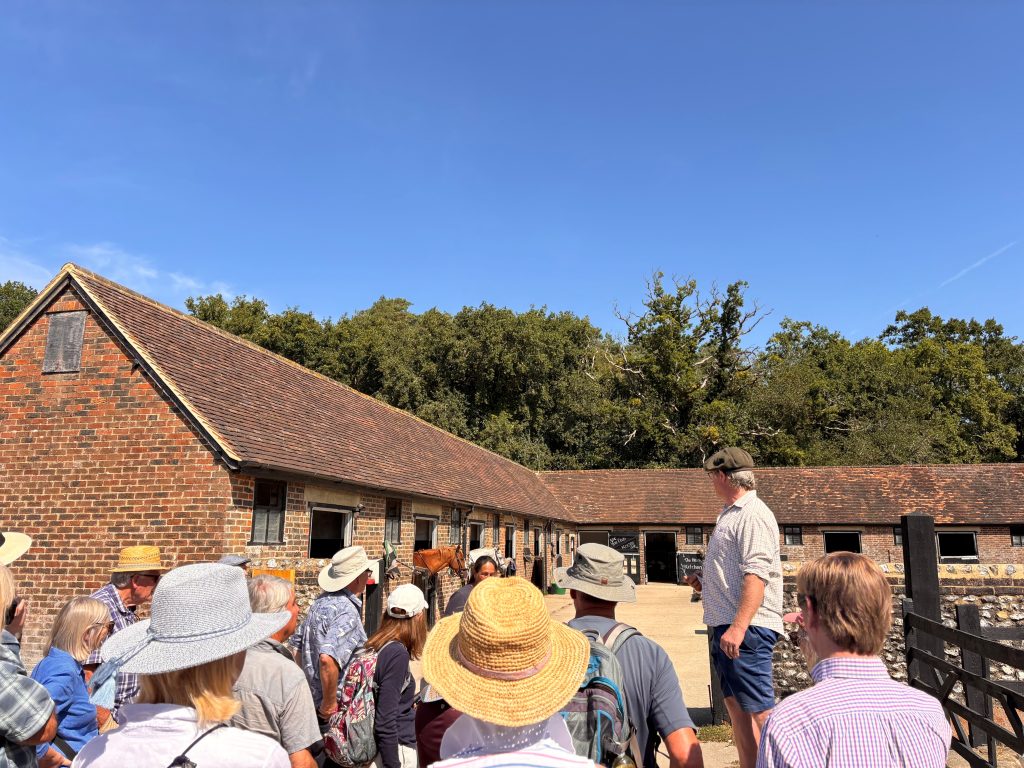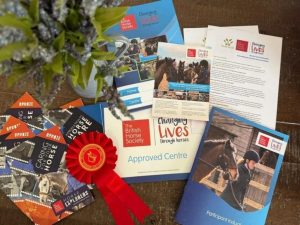Henrietta, Trustee and Marketing Communications Expert, recounts the guided tour of Westerlands Farm in Graffham, Petworth, led by farm manager Oliver Hancock.
Farming is no longer what it once was. With changes in UK tax and government policy, global tariffs and increasing complexities of a fast-changing climate, farmers are having to adapt, and fast.
The new sub-industry arising in the world of agriculture is regenerative farming, which has received media attention recently as farmers and land managers up and down the country look to work in different ways with nature. Understanding the role of regenerative farming within the agricultural industry is an area of fascination for me and so it was with great enthusiasm that I joined the Friends of the South Downs for a guided walk at Westerlands earlier this week.

If we look at some current farming statistics (sourced by gov.uk, Sept 2024), there are 209,000 farms in the UK with an average acreage of 82 hectares. In 2023 this made up around 70% of UK land. However, almost half of all farms are less than 20 hectares in size and this marks the key difference to many international competitors, namely those in the US. The main source of income from UK farms is dairy and beef which contribute £6B and £3.9B respectively to our country’s economy.
And yet in the 12 months to June 2025, 6,365 businesses in agriculture, forestry and fishing closed – the highest figure since data tracking began in 2017. Farmers are at a crisis point.
Oliver Hancock is bringing a new approach to farming at Westerlands, building a business around what one might term ‘agricultural tourism’. His goal is to make Westerlands a wellbeing destination to help overcome our modern-day ‘nature deficit disorder’, a view supported by scientific data. The Mental Health Foundation found that during the pandemic, 45% of people in the UK reported visiting green spaces such as parks helped them to cope with the challenges of lockdown. Their research went on to find evidence of the power of ‘connectedness’. This refers to the way we relate to, and experience nature, creating a strong emotional attachment to our natural surroundings. They found that people connected with nature are more likely to be happy in life with a greater sense of calm, joy and creativity with improved concentration levels. Full immersion in nature and staying in one of the properties at Westerlands is therefore recommended.
More information about the study is available here.
Other ways that Westerlands is looking to expand is through the use of horses, particularly relevant given the farm’s history. Until recently, a racing stud, the farm was first bought in the early 1900s by the founder of Black and White Whisky, Lord Woolavington. He converted the farm to equestrian use for breeding and producing horses for racing before changing hands to its current owners. The farm currently runs a pony trekking centre but will soon expand to take advantage of a new British Horse Society (The) funded programme called Changing Lives through Horses. This aims to help and support disengaged young people to develop life skills and engage positively with society.
Horses on the farm are given as natural a life as possible, and the farm is proud of its herb kitchen which uses natural herbs for remedial purposes. They even run a herb buffet where horses are allowed to pick and choose for themselves! Elly Middleton, manager of the equestrian centre explained that the horses are so sufficiently in-tune with their own needs that they pick out herbs that will replenish a vitamin or mineral deficiency they may be experiencing. The herbs the horses need taste sweet, the rest provide a bitter taste and so the horses leave what they don’t need, restoring their physical equilibrium. Such remedies may include lemon balm as an antihistamine, turmeric for arthritis, burdock root, nettles for iron or linseed oil for sweet itch.
From using a more varied crop of plants in new hedgerows, to the biomass boilers for providing hot water to homes and borehole water from underground aquifers, the farm is embracing every aspect of regenerative farming and sustainable living. Their small herd of Dexter cattle mean small animals with light feet which massage organic matter back into the soils, and a supply of beef to local and visiting customers. As an aside, the farm screened the film Six Inches of Soil so Oliver understands the value of mob grazing and restoring biodiversity through healthier soils.
The talk ended with Oliver saying they are still trying to find a break-even position for the farm, but he is determined to create a wellbeing destination, democratising access to nature, positively changing lives and using natural capital to improve mental health and happiness. It was an uplifting walk, full of interesting insights, and inspiring to see how many people wanted to learn more about this new source of income for an otherwise vulnerable industry. Westerlands plans to transition to a fully-fledged Social Enterprise later this year.
Learn more about the work being done and offerings at Westerlands.
Henrietta Lacey-Gutsell
Trustee, Friends of the South Downs




